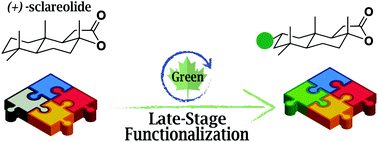Green chemistry meets medicinal chemistry: a perspective on modern metal-free late-stage functionalization reactions
Abstract
The progress of drug discovery and development is paced by milestones reached in organic synthesis. In the last decade, the advent of late-stage functionalization (LSF) reactions has represented a valuable breakthrough. Recent literature has defined these reactions as the chemoselective modification of complex molecules by means of C–H functionalization or the manipulation of endogenous functional groups. Traditionally, these diversifications have been accomplished by organometallic means. However, the presence of metals carries disadvantages related to their cost, environmental hazard and health risks. Fundamentally, green chemistry directives can help minimize such hazards through the development of metal-free LSF methodologies. In this review, we expand the current discussion on metal-free LSF reactions by providing an overview of C(sp2)–H, and C(sp3)–H functionalizations, as well as the utilization of heteroatom-containing functional groups as chemical handles. Selected topics such as metal-free cross-dehydrogenative coupling (CDC) reactions, organocatalysis, electrochemistry and photochemistry are also discussed. By writing the first review on metal-free LSF methodologies, we aim to highlight current advances in the field with examples that reveal specific challenges and solutions, as well as future research opportunities.



 Please wait while we load your content...
Please wait while we load your content...